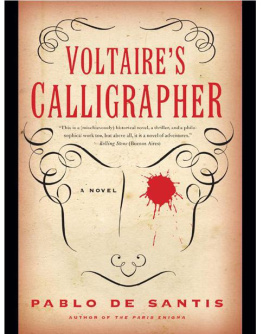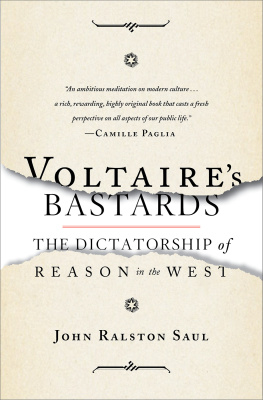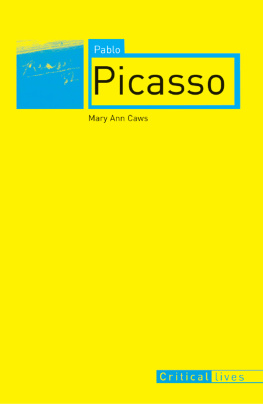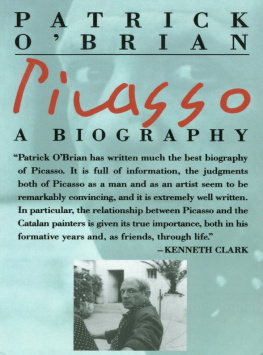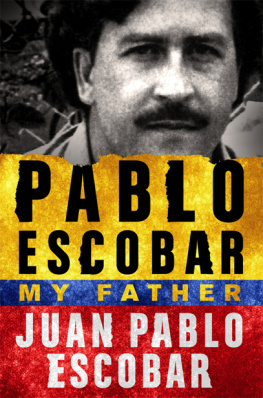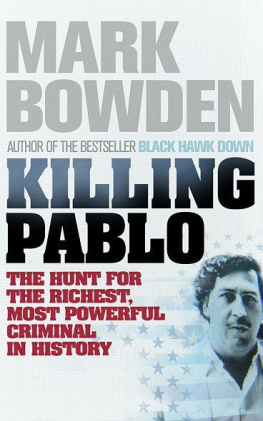Pablo De Santis - Voltaires Calligrapher
Here you can read online Pablo De Santis - Voltaires Calligrapher full text of the book (entire story) in english for free. Download pdf and epub, get meaning, cover and reviews about this ebook. year: 2010, publisher: Harper Perennial, genre: Detective and thriller. Description of the work, (preface) as well as reviews are available. Best literature library LitArk.com created for fans of good reading and offers a wide selection of genres:
Romance novel
Science fiction
Adventure
Detective
Science
History
Home and family
Prose
Art
Politics
Computer
Non-fiction
Religion
Business
Children
Humor
Choose a favorite category and find really read worthwhile books. Enjoy immersion in the world of imagination, feel the emotions of the characters or learn something new for yourself, make an fascinating discovery.
- Book:Voltaires Calligrapher
- Author:
- Publisher:Harper Perennial
- Genre:
- Year:2010
- Rating:5 / 5
- Favourites:Add to favourites
- Your mark:
- 100
- 1
- 2
- 3
- 4
- 5
Voltaires Calligrapher: summary, description and annotation
We offer to read an annotation, description, summary or preface (depends on what the author of the book "Voltaires Calligrapher" wrote himself). If you haven't found the necessary information about the book — write in the comments, we will try to find it.
Voltaires Calligrapher — read online for free the complete book (whole text) full work
Below is the text of the book, divided by pages. System saving the place of the last page read, allows you to conveniently read the book "Voltaires Calligrapher" online for free, without having to search again every time where you left off. Put a bookmark, and you can go to the page where you finished reading at any time.
Font size:
Interval:
Bookmark:
A Novel
P A B L O D E S A N T I S
TRANSLATED BY LISA CARTER

Contents

I arrived in this port with very few belongings: four I shirts, my calligraphy implements, and a heart in a glass jar. The shirts were threadbare and inkstained, my quills ruined by the sea air. The heart, however, was intact, indifferent to the voyage, the storms, the humidity. Hearts only wear out in life; after that, nothing can hurt them.
There are countless philosophical relics in Europe today, most as fake as the bones that churches revere. Saints used to be the only protagonists of such superstition, but who today would fight over a rib, a finger, or the heart of a saint? The bones and skulls of philosophers, on the other hand, are worth a fortune.
If an unwary collector even mentions the name Voltaire to any antiquarian in Paris, he will be led to a room at the back and, in absolute secrecy, shown a heart that resembles a stone, locked in a gold cage or inside a marble urn. He will be asked to pay a fortune for it, in the name of philosophy. A hollow, funereal grandeur surrounds these fake hearts while the real one is here, on my desk, as I write. The only opulence I can offer it is the afternoon light.
I live in a cramped room, where the walls erode a little more each day. The floorboards are loose and some can be lifted with ease. When I go to work in the morning, thats where I hide the glass jar, wrapped in a frayed, red velvet cloth.
I came to this port fleeing all those who saw our profession as a reminder of the former establishment. You had to shout to be heard at the National Convention, but we calligraphers had only ever learned to defend ourselves in writing. Although someone proposed that our right hands be cut off, the egalitarian solution prevailed, and that limited itself to cutting off heads.
My colleagues never lifted their eyes from their work or tried to decipher the shouts that could be heard in the distance. They continued to patiently transcribe texts that had been assigned by now decapitated officials. Sometimes, as a warning or a threat, a smudged list of the condemned would be slipped under their doors, and they would copy it out, never noticing their own name hidden among the others.
I was able to escape because time had taught to me to look up from the page. I gave myself a new name and a new profession, and I forged documents to present at the checkpoints between one district and another, one city and another. I fled to Spain, but my fugitive impulse was such that I didnt stop there; I wanted to get even farther away. With my lack of funds and ragged appearance, I boarded the only ship that offered me passage. It was the first time I had ever been on a boat, perhaps because of the memory of my parents, who had died in a shipwreck. As partial payment for my fare, I took dictation for the captain (he had a mountain of correspondence to attend to from women and creditors). Writing those letters and having my mistakes corrected was how I learned Spanish.
It was a long journey. The ship put in at port after port, but none of them seemed right. I would stare at the buildings along the coast, waiting for a sign that I had found my place, but there was only one sign I was prepared to understand: the one that says there is nowhere further to go. This was the ships last stop.
This is a city people come to by mistake, those who are fleeing some peril or government and wind up running away from the world. On the boat to shore, I was sure my professional life was over, that I would never see another drop of ink. Who in these dark, muddy streets could possibly need a calligrapher? I was wrong: I soon discovered a profound reverence for the written word, even greater here than in the cities of Europe. They love their signed, sealed directives; their papers that pass from hand to hand, generating still more paper; their detailed orders from Europe; their lists of items ruined during the voyage. Everything is stamped and signed with a flourish, then duly filed in a cabinet never to be seen again, swallowed up by the disarray.
Each morning, in a frigid office at city hall, I transcribe official documents and legal rulings. My colleagues often mention the name Voltaire, but theyd never believe I once worked for him. They all assume everything that arrives on these shores is either untrue or unimportant.
A wind blows in through my window and sets everything aflutter. I place the heart on my papers to keep them from blowing away.
W hen the Retz sank and my parents were lost, I was left in the care of my uncle, marchal Dalessius. He asked me what my talents were, and I showed him some alphabets I had invented. On one page the letters were the branches of a tree, hinting at leaves and thorns; on another they were Oriental palaces and buildings; and on the thirdthe most complicatedthe letters were resigned to simply being letters. My uncle had been waiting for some indication of how best to get rid of me, and those sheets of paper were his answer. He sent me to Monsieur Vidors School of Calligraphy, where the mysterious Silas Darel had studied.
My difficulties with authority soon began: I wasnt satisfied with writing alone; I wanted to invent pens and inks, to reestablish our craft. Calligraphy was a dying art, condemned by a shortage of masters, besieged by the printing press, reduced to the lone squad or man. I would scour the history books for heroes who might be considered calligraphers, but there were only heroes who never wrote a word.
The most enterprising of us, those who hoped to follow in Silas Darels footsteps, would read whatever we could, from old school textbooks to anonymous dissertations on cryptography. Our profession was so dead that we felt like archaeologists of our own kind.
Complete silence reigned in the classroom, interrupted only by the scratching of quills on papera noise that was itself a metaphor for silence. The long hall had floor-to-ceiling windows on both sides, and our teachers insisted they remain open, even in winter, claiming that a well-ventilated room was essential to good penmanship. In blew dirt, twigs, and pine needles that my classmates would angrily brush off the page, but I would leave them, believing you must respect the marks of circumstance when writing. All but a few resigned themselves to using the schools supplies, purchased twice a year from a Portuguese sailor: black ink that soon lost its color, red ink full of lumps, sheets of paper whose imperfections caused letters to jump off the page as if skipping rope, and goose quill pens chosen at random.
After dinner and prayers, I would hide in my room or the garden, beside a stone fountain with green water so putrid you could write with it, and experiment with my own inventions. My favorite ink consisted of pigs blood, alcohol, and iron oxide. I would buy the left wings of black geese at the market and pluck the feathers one by one, discarding fourteen out of every fifteen. Having selected the best, I would heat sand in a copper bowl and then pour it into a wooden case: there I would leave the quills to harden. I kept all of my implements in a sewing box that had belonged to my mother and still held a bronze thimble and the smell of lavender.
When I left Vidors School, my uncle found me a job with the courts. It was a natural fit for those of us who graduated; others wound up as librarians or as private scribes for the most distinguished families. I began to carry the tools of my trade from one government office or courthouse to another. This was an era of all things fragile and futile: I have never seen anything like it since. I was once given a death sentence to prepare, full of arabesques and wax seals, that was then shown to the convict on his way to the gallows. He said: Thank the calligrapher for having turned my crimes into something so beautiful; I would kill ten more men just to have him create something similar again. Never, in my life, have I received higher praise.
Font size:
Interval:
Bookmark:
Similar books «Voltaires Calligrapher»
Look at similar books to Voltaires Calligrapher. We have selected literature similar in name and meaning in the hope of providing readers with more options to find new, interesting, not yet read works.
Discussion, reviews of the book Voltaires Calligrapher and just readers' own opinions. Leave your comments, write what you think about the work, its meaning or the main characters. Specify what exactly you liked and what you didn't like, and why you think so.

